One Hour One Life is a survival game where death comes swiftly, even if you do everything right. You’ve got one hour before your character permanently dies and you spend your first ten minutes as a mostly helpless child. Your parents are other players. Hopefully, everyone collaborates to get through a huge crafting tree that represents all of human progress, from sticks and stones to iPhones. In creating the game, Jason Rohrer has had to confront some tough questions about social norms, gender and how his experience fits into it all.
Rohrer, creator of experimental games like Passage, The Castle Doctrine, and Cordial Minuet, was inspired to make One Hour One Life by the way people mercilessly troll each another in survival games.
Players start as babies who can only type the letter A in chat, utterly incapable of fending for themselves, and every character drops dead after 60 minutes, each of which counts as a year. Rohrer hopes that, instead of trolling, this setup will encourage adults to nurture kids, and kids won’t turn around and knife their doting parents after ten minutes. By forcing players to work together, Rohrer hopes to create genuine bonds between them.
“What if we make time precious?” he said in an interview. “What if we make life precious? What if, in order to troll, you’d have to have some player take care of you for at least 10 minutes? Are you going to still want to troll after going through all that, and having this person be nice to you this entire time? Are you still going to immediately go and try and shoot them right after that ten minutes is over, and you’re old enough to finally pick up a gun?”
Rohrer wants One Hour One Life, as cartoony as it might look, to hew more closely to real life than other games, so that players might recreate the backbones of society, or at least a few vertebrae. He wants the birth mechanic to encourage players to build a framework in which societies to emerge, along with their institutions, traditions, and legacies.
But modelling every element of human existence is a gargantuan undertaking for players, as well as for a game’s creator. In attempting to turn the vagaries of life into a playable game, Rohrer has to make concessions to create the game he wants.
For instance, romantic pairing isn’t core to the experience Rohrer wants to create. To remove courting and sex from the equation, babies just sort of happen randomly, but only to female characters. Physical sex characteristics are assigned randomly, so it’s not like players are choosing the added responsibility of a child. Babies just spawn next to female characters, kickstarting the core mechanics of the game, but in the process cutting out sex, choosing to be a parent, and how male parents might choose to interact with their children.
“We didn’t want to have a game where you were negotiating consent and all this other kind of stuff,” said Rohrer, “which is just a whole messy distraction from what the game is actually about, which is kind of the larger picture of your place in this family tree. It’s not really about courting.”
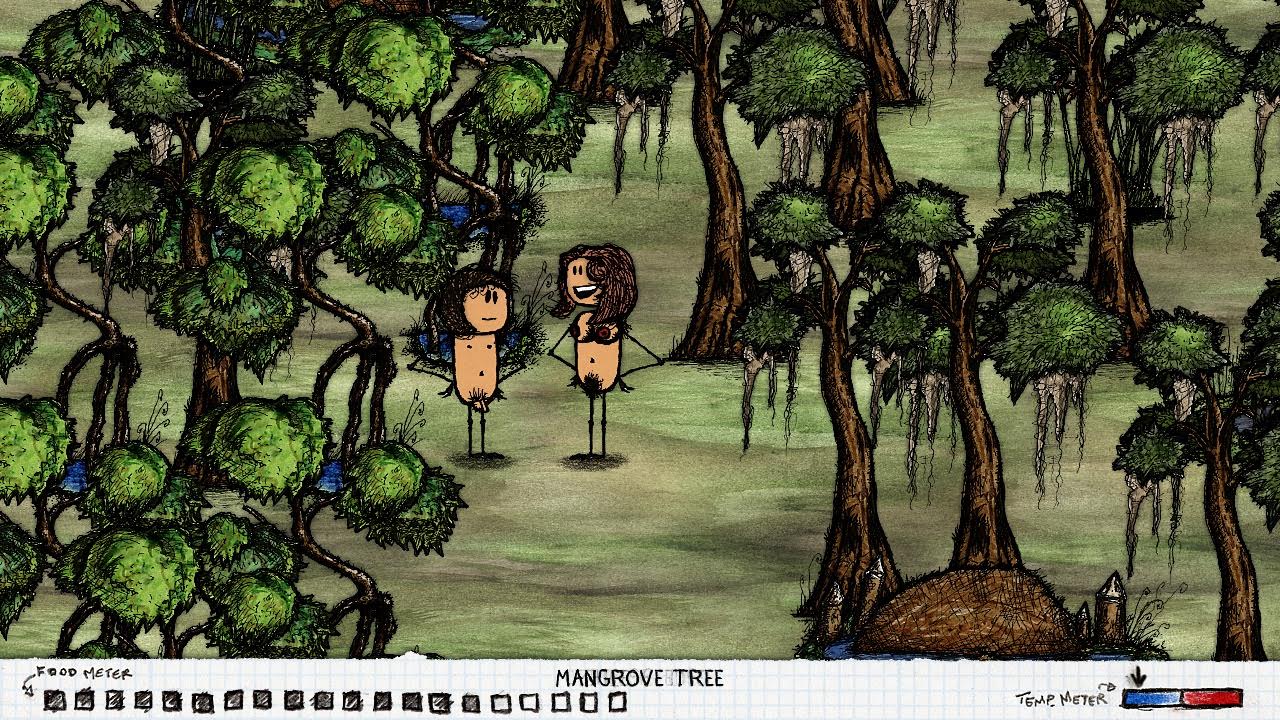
Male characters can help out with kids if they want, or they can just keep on picking berries and trying to fashion twigs into the first personal computer. There’s nothing obligating women to take care of kids either, but they will naturally be in direct contact with them more. Plus, while men have to forage for food, women can breastfeed kids. Rohrer thinks that anything beyond that would complicate things too much.
“If someone were to chose not to mate, then the whole game would fall apart,” Rohrer said, noting that the game’s spawning system depends on babies being able to exist rather than players navigating whether or not to have children. “I want the fundamental experience of this game to be living out your life, from when you’re a helpless baby and you’re dependent on somebody else, to old age.”
So in making a “universal” game, Rohrer is already removing certain essential links from the societal chain — sex, romance, and pregnancy — to create the experience he wants. I pointed out that the system he currently has in place recreates societal norms that equate women with childbirth. As long as the game is an abstraction that isn’t delving into aspects of pregnancy, why not have babies poof into existence next to biologically male characters as well?
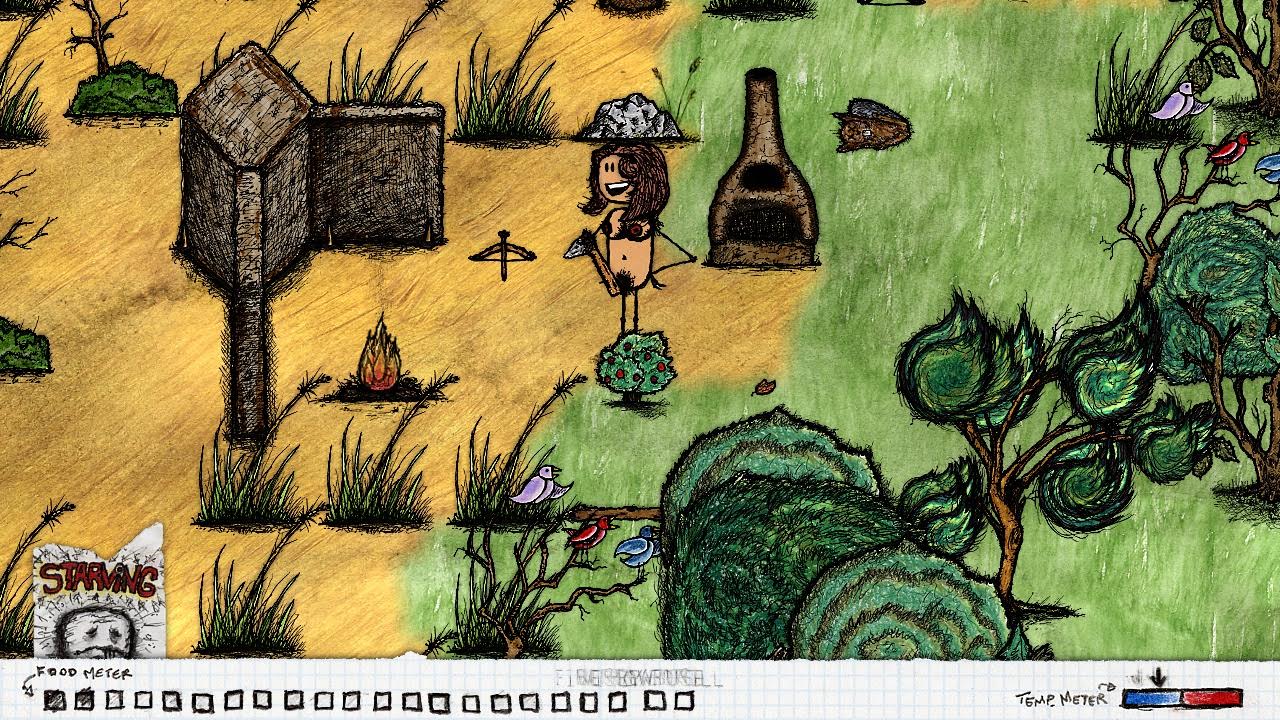
Rohrer told me, “I think that that gender difference, and especially the way that the different genders have been sort of saddled — even to this day, in our modern world — with the possibility of having an offspring that is indisputably yours, has dramatically shaped the structure of society and the way people behave and so on.” So while the choice to only have female characters have babies was a mechanical one, it also gets at deeper issues Rohrer himself wants to explore.
Rohrer added that, to him, being a man constitutes a sort of “dead end.” “We don’t ever have anybody come out of us,” he said. “We’re just hoping to kind of be part of that tree, kind of tangentially almost.” He wants that feeling to come through in the One Hour One Life‘s mechanics. “You’re like, ‘I’m a man. Wow, that sucks. I see all these other players having babies, and I will never actually have one of my own,’” he said.
These issues are inspired by his own experience of being a parent.”I’ve been married 13 or 14 years now, and I’m at the stage in my life where I’m nearing 40 years old and thinking about my place in this human family tree,” he said. He told me he was interested in systems underpinning romance and related aspects of the human experience when he was younger, but not so much anymore.
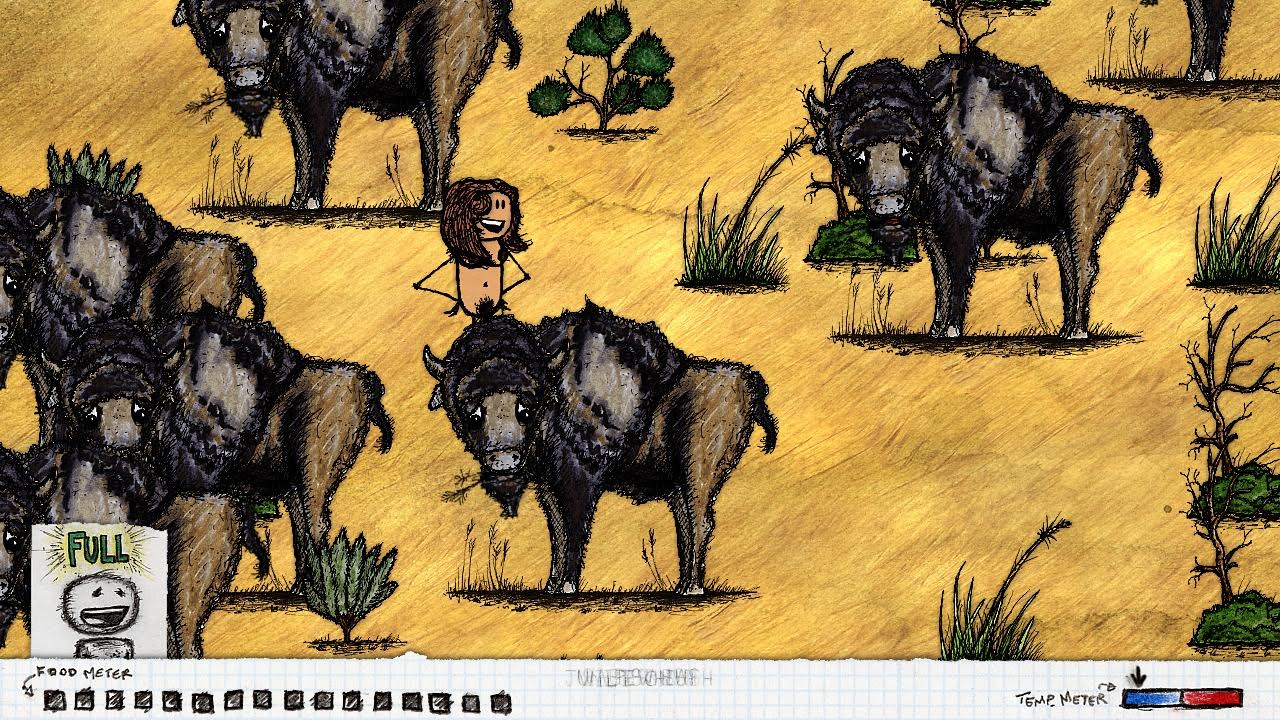
Rohrer is now the father of three sons. He and his wife have tried to raise their sons in a way that doesn’t foist traditional models of masculinity upon them (“My three boys, everyone still thinks they’re girls, because they have never had haircuts,” he told me), but he’s still found gender to play a role in his parenting.
“I wanted to be this equal-sharing parent,” he said, “but it was just like all these times where the baby needed to be with my wife, because of the way it was being fed. I was like, ‘I can’t breastfeed this baby, so I can’t take it out for two hours and walk around downtown with it, because it’s going to get hungry, and she needs to be there.’ I would try and take it out for an hour just to give her a break or whatever, and it wouldn’t really work as well as it should have. I couldn’t just spend all day with the baby.”
Rohrer said he witnessed this in other heterosexual couples, too — ones who didn’t necessarily want it to be that way, but who ultimately fell into the time-worn pattern of ‘woman spends the most time with kids, man spends the most time at work.’ He wants to explore the roots of that in One Hour One Life, as well as other “frustrating” ways society aligns itself around gender norms. “We’re saddled with [concepts of gender] whether we like it or not,” he said. “I want to be able to make work about that, and those are the things that end up being kind of important to me.”
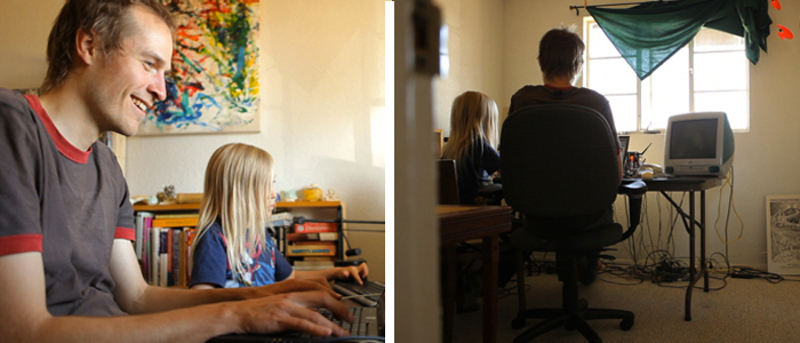
Image credit: Indie Game The Movie.
So even though One Hour One Life is tackling a topic as enormous as the human experience and the emergence of society, Rohrer’s beliefs and experiences are inherently coded into the system. Another game with this same ‘universal’ setup might turn out totally different if it came from somebody who didn’t share Rohrer’s background. It might depict gender in less binary ways, or put more of an emphasis on women’s experience of the world, or study the effects of attraction and sexuality — all things that doubtless helped steer humanity to the place we’re at today.
Rohrer is interested in how other people’s experiences will play out in his vision. “If we say that the only reason we hold on to these [gender norms and societal structures] is just out of habit or culture even though they don’t make sense — which may be true — then the question is whether that stuff will happen in the game, because people will carry their real-world instincts into the game… or whether there’s going to be instincts that build up in the game, from playing the game,” he said.
Rohrer still wants to understand his own role in the world better, and while that’s not all One Hour One Life is about by any means, it colours the game. “I have reflected a lot on my role as a man in the world over the course of my life,” he said.
“Going from a young 20-year-old who was absolutely questioning everything, and tearing everything down, and trying to overturn every existing system and institution, to then coming full circle and saying, ‘I’m trying to understand those things more,’ and then also seeing some of them come crashing down on my head anyway, even though I thought I had insulated myself from them — definitely, it’s made me think about being a man and what that means. And I don’t know yet.”
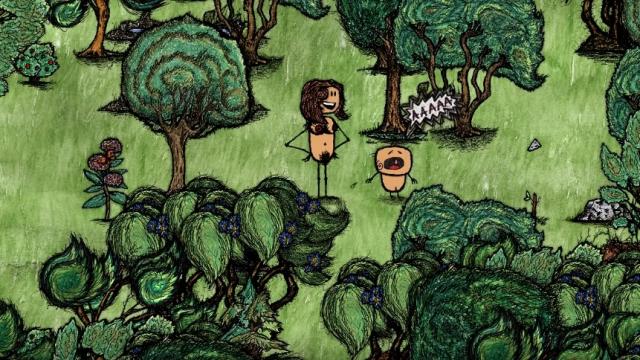
Comments
7 responses to “The Difficulty Of Making A Game Where Players Are Other Players’ Parents”
Wow, I wonder why societal norms equate women with childbirth?
Fucking patriarchy, man….
Oh wait, it’s because they have ALL the vaginas
You are missing the point. The concern is raised over the literal meaning of the word “equate”, i.e. a woman IS her capacity to birth children and nothing else.
Societal norms don’t equate women with childbirth, biological norms do. Society will continue to follow nature’s lead until we can shake off evolutionary and biological imperatives to pro-create as a species.
No amount of social progress will be able to overwrite the arguably unfair fact that things like a woman’s peak childbearing years overlap with a person’s peak career growth years until science can extend or re-position that fertility window.
It’s a raw deal. One specific to women. Each gender, race, orientation, etc. has their cross to bear though, and we need to follow Rohrer’s lead: less forced destruction of these norms, and more understanding of their persistence. Some you can change, some you can’t.
I don’t think we disagree on those things nor I disagree with Rohrer’s outlook and purpose for creating the game. I’m not talking about societal norms but about ethical treatment. Childbirth is something that most women will do once or twice during their average 70-year lifespan. As much such momentous occasion is defining and relevant for the woman, her inner circle and the species in general, it is still an isolated event across the millions experienced in her lifetime. By your words, I’m sure you are not one of them, but there are people out there (including some women, themselves!) who consciously or subconsciously reduce women to their role as a womb.
I didn’t know this until I met a partner with whom the consideration of having kids was seriously discussed (and I corroborated it talking with other women afterwards): the one major concern in many women’s minds when it comes to deciding whether they want kids or not (even over the well-known pains and discomforts associated with it) is the almost paralysing fear of erasure of their personality and worth as existing separated from their progeny, from other people’s viewpoint.
So the concern of the interviewer was valid when he feared that having women’s sole achievement and purpose in the game be spawning new players would feed that narrative. Rohrer response, though, was quite good as precisely the fact that any player can randomly experience such “naturally” enforced role should get some people challenging their own behaviour. For sure there will be some dickheads who will interpret the message wrongly, reinforcing their stereotypes and who will quit and “reroll” whenever they’re spawned as women, but hopefully, those will be the minority.
Yeah i get the concern but honestly it’s (completely understandable, uniquely human) narcissism to see ourselves as anything but a link in the chain of life, defined by things like our species and our gender. We are born to procreate, that’s our purpose. A woman is a womb. A man is something even less than that. It’s grim but it’s true.
Our society is based on these facts. It doesn’t mean that you can’t take a positive existentialist approach and create a meaningful and gratifying life for yourself and within society as something MORE than a delivery system / vessel for the next generation, but it doesn’t erase that inherent truth that we all need to accept and, ideally, embrace. You don’t need to be “reduced” to a singular facet of your existence, but it is the core reason for your existence.
For most of your life, you will define your mother or father by their reproductive roles. It’s rare to call your parents by their first name even when you’re older. They literally take on a new name when they have a child and that name is attached to an identity as well.
I know this perception is totally emotionally detached and maybe it’s easier to see things this way as someone who is yet to start a family, but i think knowing these things frees you from the weight of these fears.
To discuss all these things philosophically is fine and even enriching. We could keep going around that topic from an entirely detached, academic point of view for hours. The problem, though, is when all these things that are natural and understandable generate behaviours that are reductive or minimising. Unfortunately, the human mind often sees as fair play to take advantage of things that look “less than human”, so any categorisation or stereotyping that allows a certain type of person to dehumanise a person to a limb or an organ is ripe for abuse. I don’t have hard data for this, but I’m positive that most cases of physical, mental or emotional abuse of a woman can be traced to an internalised narrative in which the woman is merely a womb and/or vagina, or maybe a pretty face.
So you and I can talk and theorise about these matters among us, but when a mass-marketable product is being planned, the possibility of feeding such narratives is a valid concern, I believe.